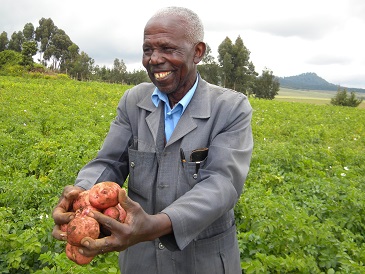The non-profit African Potato Association (APA) is an organization dedicated to potato research and promotion. Founded in 1985, the APA consists of scientists, experts, and practitioners from over 20 African countries. The APA is collaborating with the Kenyan Ministry of Agriculture, the National Potato Council of Kenya (NPCK), and CIP to organize this high level international conference, which has also received sponsorship from numerous groups and agencies including CTA, FAO, Syngenta, and the CIP-led CGIAR Research Program on Roots, Tubers, and Bananas (RTB).
While South Africa and Egypt have successfully hosted previous conferences, Kenya will be the host country for the 2013 conference based on the increased importance played by potato and sweetpotato in improving food security and providing nutrition for the Kenyan people. However, potato and sweetpotato are not important to Kenya alone.
Potato production in Sub-Saharan Africa (SSA) has more than doubled over the past 20 years with 70% of this growth concentrated in eastern Africa. The shorter growing season of 90-120 days, and the potential production of 216 megajoules per hectare per day, makes potato the largest energy provider of all major arable crops – almost double that of wheat and rice – and African farmers are beginning to take advantage of this versatile crop. Potatoes are not only of increasing importance to rural farmers, but are a highly-preferred food in urban areas where consumption is increasing rapidly, giving potatoes high market potential.
Sweetpotatoes are equally important due to its high nutrient content – the orange-fleshed varieties are rich in pro- vitamin A– and its ability to grow well under low input conditions under a broad range of agro-ecologies. Rustic sweetpotato is known as the classic food security crop in Africa—the crop that is there when the maize fails. CIP’s Jan Low and leader of the Sweetpotato for Profit and Health Initiative (SPHI), explains that, “Vitamin A deficiency among children is a major problem in most African countries. The introduction of vitamin A-rich sweetpotato throughout many areas of Africa can ensure that children under five years of age grow and develop normally and stay healthy.”
 While there have been substantial increases in production in potato and sweetpotato in Africa over the past few decades, the continent is however suffering from a number of problems and constraints that affect crop production. These include a lack of clean seed, unavailability of adequate improved varieties, inefficient use of organic matter, farm manure and other resources, insufficient nutrient supply to crops, and restricted market opportunities.
While there have been substantial increases in production in potato and sweetpotato in Africa over the past few decades, the continent is however suffering from a number of problems and constraints that affect crop production. These include a lack of clean seed, unavailability of adequate improved varieties, inefficient use of organic matter, farm manure and other resources, insufficient nutrient supply to crops, and restricted market opportunities.
The conference will address these problems by laying out three clear-cut objectives. These include offering an opportunity to review progress in potato and sweetpotato research in Sub-Saharan Africa (SSA); giving participants the chance to engage with stakeholders and agents for development who will be participating through exhibitions, presentations and panel discussions; and lastly by promoting the public-public and public-private sector partnerships which are likely to emerge as a result of knowledge sharing during the conference. Additionally, the conference will encourage public and private enterprises to interact with potato and sweetpotato stakeholders from outside of Africa.
The key theme of the 9th Triennial Conference is to transform potato and sweetpotato value chains for food and nutrition security.
“Increasing involvement by the private sector in potato and sweetpotato value chains would greatly benefit rural African farmers, and offer a means to unlock yield gaps and overcome bottlenecks limiting the full utilization of the potato sector” says Elmar Schulte-Geldermann, Potato Science Leader at CIP’s SSA office. Furthermore, the conference will encourage the integration of national agricultural research and extension systems into the value chain, as well as farmer training schemes, in order to stimulate innovation. Schulte-Geldermann goes on to explain that, “The conference will bring together regional players and exploit economies of scale for knowledge and technology sharing, promoting farmer-friendly crop-related regulations and policies, and expanding intra-regional trade.”
Internationally recognized experts will host the conference and encourage dialogue on a number of subthemes. Participants will witness potato and sweetpotato innovation in the field during various day trips over the course of the conference. Sponsors such as RTB have provided scholarships to over 70 African scientists and other potato and sweetpotato agents to participate in the conference. Furthermore, exhibitions and stands by various sponsors, companies, innovative individuals, and organizations such as CIP, will serve to promote dialogue and knowledge sharing as part of a collective drive to alleviate poverty and increase food security and nutrition across Africa.
The International Potato Center, known by its Spanish acronym CIP, was founded in 1971 as a root and tuber research-for-development institution delivering sustainable solutions to the pressing world problems of hunger, poverty, and the degradation of natural resources. CIP is headquartered in Lima, Peru and has offices in 30 developing countries across Asia, Africa, and Latin America. Working closely with partners, CIP seeks to increase food security, well-being, and gender equity for poor people in the developing world. CIP furthers its mission through rigorous research, innovation in science and technology, and capacity strengthening regarding root and tuber farming and food systems.
CIP is a member of the CGIAR Consortium, a global partnership that unites organizations engaged in research for a food secure future. CGIAR research is dedicated to reducing rural poverty, increasing food security, improving human health and nutrition, and ensuring more sustainable management of natural resources. Donors include individual countries, major foundations, and international entities.
